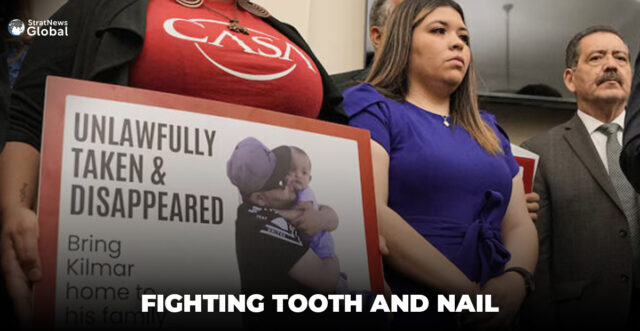Lawyers representing a group of Venezuelan men detained in Texas asked the U.S. Supreme Court (SCOTUS) on Friday to halt what they described as the Trump administration’s plan to deport the men imminently, without the judicial review the Court had previously required.
In a court filing, lawyers for the American Civil Liberties Union said some of the dozens of the men held at the Bluebonnet Detention Facility in Anson, Texas, had already been loaded onto a bus and told they were to be deported.
Shortly after the filing, a government lawyer said he was unaware of plans by the Department of Homeland Security to deport the men on Friday, but there could be deportations on Saturday.
“I’ve spoken with DHS. They are not aware of any current plans for flights tomorrow but I have also been told to say they reserve the right to remove people tomorrow,” Justice Department attorney Drew Ensign told a district court in a separate but related case.
In that district court case, Judge James Boasberg denied an ACLU request to block Trump from deporting suspected members of the Venezuelan gang Tren de Aragua.
Full-Blown Constitutional Crisis
The cases raise questions about the Trump administration’s adherence to limits set by the Supreme Court. It carries the risk of a significant clash between the two coequal branches of government and possibly even a full-blown constitutional crisis.
The lawyers for the Venezuelans filed with the Supreme Court after failing to get a rapid response from earlier filings on Friday before U.S. District Judge James Hendrix in Abilene, Texas, and the Fifth U.S. Circuit Court of Appeals in New Orleans to block any such deportations.
The ACLU said the men had been handed forms indicating they were classified as members of the Tren de Aragua gang.
At issue is whether the Trump administration has fulfilled the Supreme Court’s standard for providing the detainees due process before sending them to another country – possibly to the notorious prison in El Salvador where others are jailed.
It was unclear on Friday how many people were potentially to be deported, and where they might be taken.
The men’s deportation would be the first since the Supreme Court told the Trump administration on April 7 that it must provide notice to Venezuelan migrants it is seeking to deport and give them the opportunity to challenge their deportations in court.
Habeas Corpus Relief
In a 5-4 ruling, the Supreme Court allowed removals under that law to continue, but specified that “the notice must be afforded within a reasonable time and in such a manner as will allow them to actually seek habeas relief in the proper venue before such removal occurs”.
Habeas corpus relief refers to the right of detainees to challenge the legality of their detention. It is considered a bedrock right under U.S. law.
The ACLU filed a photo of one of the notices with the court.
“You have been determined to be an Alien Enemy subject to apprehension, restraint, and removal,” read the notice. The recipient’s name was obscured, and it was noted that the migrant refused to sign it on April 18.
Trump’s Crackdown
Elected last year on a promise to crack down on migrants, Trump invoked the law last month in a bid to bypass normal procedures and swiftly deport alleged members of Tren de Aragua, which his administration labels a terrorist group.
Asked about the planned deportations on Friday, Trump said he was unfamiliar with the particular case but added: “If they’re bad people, I would certainly authorize it.”
“That’s why I was elected. A judge wasn’t elected,” he told reporters at the White House.
Defense lawyers and Democrats in Congress have pressed the administration to demonstrate how it knows the Venezuelans are members of the gang, which is active in human trafficking and other crimes in South America but has a smaller U.S. presence.
“We are not going to reveal the details of counter terrorism operations, but we are complying with the Supreme Court’s ruling,” Assistant Secretary for U.S. Homeland Security Tricia McLaughlin said in a statement on Friday.
No Clear Indication
The Supreme Court did not indicate how much notice should be provided. Lawyers around the country have asked that the migrants be given 30 days’ notice to allow them to contest their deportations. The Trump administration has not said publicly how much notice it intends to give the migrants.
Judges in Manhattan, Denver, and Brownsville, Texas, have issued temporary orders blocking deportations under the Alien Enemies Act within their district.
On March 15, the Trump administration deported more than 130 alleged members of the Tren de Aragua gang to El Salvador, citing the Alien Enemies Act, best known for being used to intern and deport people of Japanese, German and Italian descent during World War Two. Many of the migrants’ lawyers and family members say they were not gang members and had no chance to dispute the government’s assertion that they were.
U.S. District Judge James Boasberg in Washington, D.C., swiftly blocked any further deportations under the law. Trump then called for Boasberg’s impeachment, prompting a rare rebuke from U.S. Chief Justice John Roberts, who said appeals, not impeachment, are the proper response to adverse court decisions.
Boasberg is now probing whether the Trump administration violated his order to return the migrants, and warned that he could hold officials in contempt of court. An appeals court paused that inquiry on Friday.
The Justice Department’s statement that there were no plans for immediate deportations of Venezuelans was made during arguments on Friday in Boasberg’s court. The judge had convened the hearing to weigh the ACLU’s request for an emergency order blocking the administration from deporting people under the Alien Enemies Act without proper legal notice.
(With inputs from Reuters)





